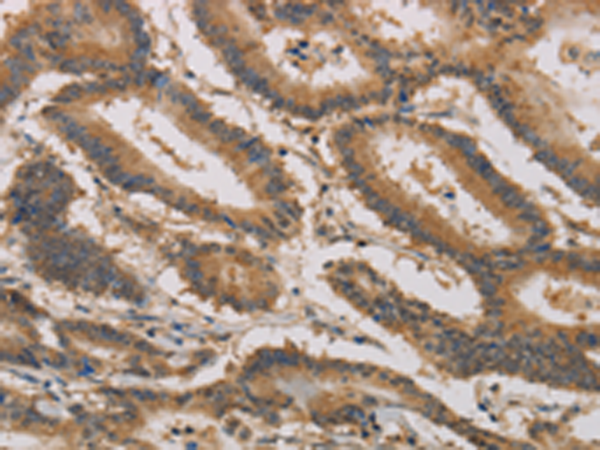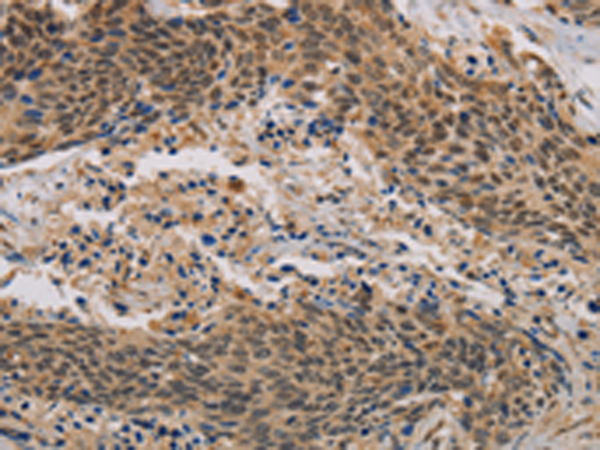

| WB | 咨询技术 | Human,Mouse,Rat |
| IF | 咨询技术 | Human,Mouse,Rat |
| IHC | 1/50-1/200 | Human,Mouse,Rat |
| ICC | 技术咨询 | Human,Mouse,Rat |
| FCM | 咨询技术 | Human,Mouse,Rat |
| Elisa | 1/2000-1/5000 | Human,Mouse,Rat |
| Aliases | MDL1; MDL-1; CLECSF5 |
| Host/Isotype | Rabbit IgG |
| Antibody Type | Primary antibody |
| Storage | Store at 4°C short term. Aliquot and store at -20°C long term. Avoid freeze/thaw cycles. |
| Species Reactivity | Human |
| Immunogen | Synthetic peptide of human CLEC5A |
| Formulation | Purified antibody in PBS with 0.05% sodium azide and 50% glycerol. |
+ +
以下是关于CLEC5A抗体的3篇代表性文献,简要整理如下:
---
1. **文献名称**:*CLEC5A is critical for dengue virus-induced inflammatory response and lethality*
**作者**:Chen, S.T., et al.
**摘要**:该研究通过使用抗CLEC5A的中和抗体,证明阻断CLEC5A与登革热病毒的结合可显著减少小鼠模型中的炎症因子风暴和组织损伤(如脑部和肠道),显著提高生存率,但未影响病毒载量,提示CLEC5A是介导病毒相关病理的关键受体。
---
2. **文献名称**:*Targeting CLEC5A reverses immune exhaustion and reduces pathogenic inflammation in sepsis*
**作者**:Hsieh, Y.L., et al.
**摘要**:研究发现,在败血症模型中,抗CLEC5A抗体治疗能抑制过度炎症反应,恢复巨噬细胞的免疫功能,减少促炎细胞因子(如IL-1β、TNF-α)释放,同时增强细菌清除能力,显著改善脓毒症小鼠的生存结局。
---
3. **文献名称**:*CLEC5A regulates Japanese encephalitis virus-induced neuroinflammation and lethality*
**作者**:Wu, M.F., et al.
**摘要**:该文献表明,抗CLEC5A抗体可阻断日本脑炎病毒(JEV)与CLEC5A的相互作用,抑制小胶质细胞和巨噬细胞的过度活化,减轻中枢神经系统炎症和血脑屏障破坏,从而降低JEV感染小鼠的死亡率。
---
如需具体文献来源(期刊、年份等),可进一步补充关键词或数据库检索条件。
The C-type lectin domain family 5 member A (CLEC5A), also known as myeloid DNAX activation protein 12 (DAP12)-associating lectin-1 (MDL-1), is a pattern recognition receptor primarily expressed on myeloid cells, including macrophages, dendritic cells, and neutrophils. It belongs to the C-type lectin receptor family and plays a critical role in innate immunity by recognizing pathogen-associated molecular patterns (PAMPs) from viruses, bacteria, and fungi. CLEC5A interacts with viral glycoproteins, such as dengue virus (DENV) and Japanese encephalitis virus (JEV), triggering proinflammatory responses through its association with the DAP12 signaling adaptor. This activation leads to the release of cytokines, contributing to both host defense and pathogenic inflammation, including cytokine storms in severe infections.
CLEC5A antibodies are tools developed to modulate this receptor’s activity. Neutralizing antibodies against CLEC5A have been explored therapeutically to suppress excessive inflammation in diseases like dengue hemorrhagic fever, rheumatoid arthritis, and sepsis. For example, anti-CLEC5A antibodies blocked DENV-induced plasma leakage and lethality in murine models. Additionally, these antibodies are widely used in research to study CLEC5A’s ligand interactions, signaling pathways, and roles in autoimmune or infectious diseases. Both monoclonal and polyclonal antibodies enable detection of CLEC5A expression in immune cells, aiding mechanistic studies of its dual role in pathogen clearance and inflammatory tissue damage.
×